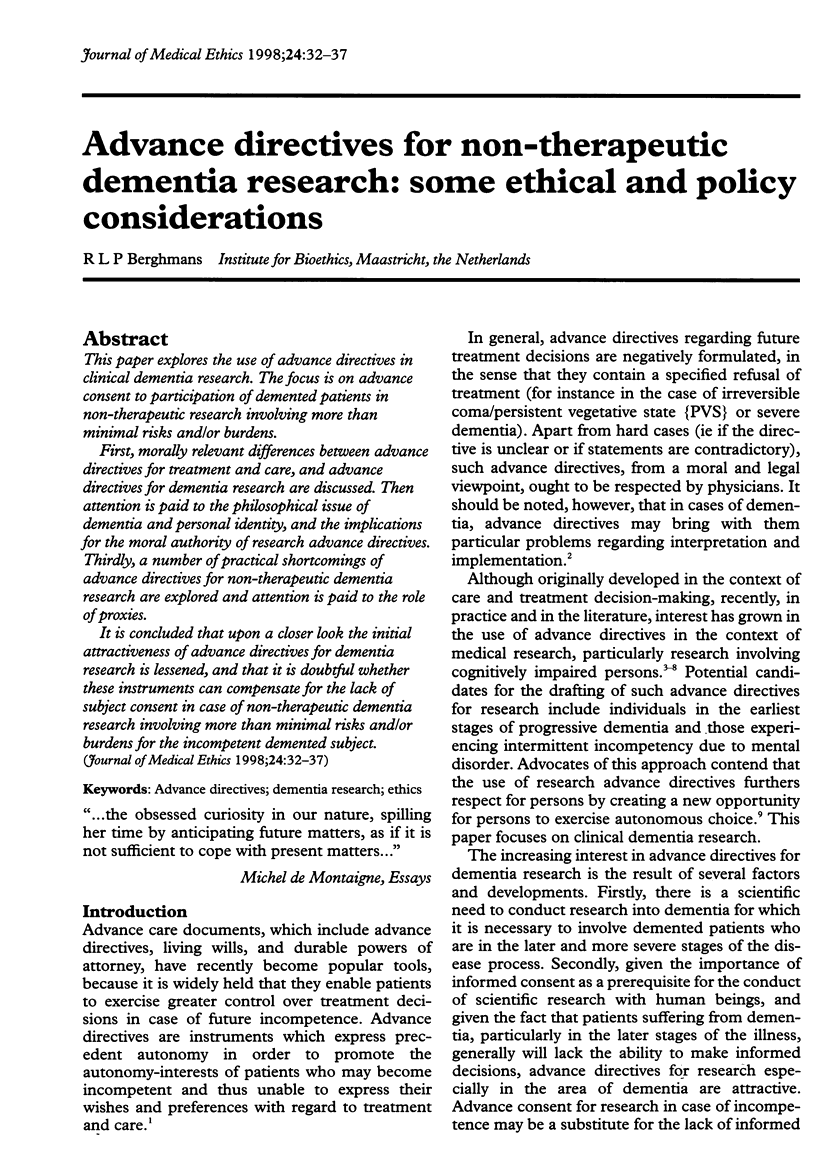Abstract
This paper explores the use of advance directives in clinical dementia research. The focus is on advance consent to participation of demented patients in non-therapeutic research involving more than minimal risks and/or burdens. First, morally relevant differences between advance directives for treatment and care, and advance directives for dementia research are discussed. Then attention is paid to the philosophical issue of dementia and personal identity, and the implications for the moral authority of research advance directives. Thirdly, a number of practical shortcomings of advance directives for non-therapeutic dementia research are explored and attention is paid to the role of proxies. It is concluded that upon a closer look the initial attractiveness of advance directives for dementia research is lessened, and that it is doubtful whether these instruments can compensate for the lack of subject consent in case of non-therapeutic dementia research involving more than minimal risks and/or burdens for the incompetent demented subject.
Full text
PDF





Selected References
These references are in PubMed. This may not be the complete list of references from this article.
- Buchanan Allen. Advance directives and the personal identity problem. Philos Public Aff. 1988 Fall;17(4):277–302. [PubMed] [Google Scholar]
- DeRenzo E. Surrogate decision making for severely cognitively impaired research subjects: the continuing debate. Camb Q Healthc Ethics. 1994 Fall;3(4):539–548. doi: 10.1017/s0963180100005429. [DOI] [PubMed] [Google Scholar]
- Dresser R. S., Robertson J. A. Quality of life and non-treatment decisions for incompetent patients: a critique of the orthodox approach. Law Med Health Care. 1989 Fall;17(3):234–244. doi: 10.1111/j.1748-720x.1989.tb01101.x. [DOI] [PubMed] [Google Scholar]
- Dresser R. Dworkin on dementia. Elegant theory, questionable policy. Hastings Cent Rep. 1995 Nov-Dec;25(6):32–38. [PubMed] [Google Scholar]
- Dresser R. Mentally disabled research subjects. The enduring policy issues. JAMA. 1996 Jul 3;276(1):67–72. [PubMed] [Google Scholar]
- Elliott C., Elliott B. From the patient's point of view: medical ethics and the moral imagination. J Med Ethics. 1991 Dec;17(4):173–178. doi: 10.1136/jme.17.4.173. [DOI] [PMC free article] [PubMed] [Google Scholar]
- Freedman B., Fuks A., Weijer C. In loco parentis. Minimal risk as an ethical threshold for research upon children. Hastings Cent Rep. 1993 Mar-Apr;23(2):13–19. [PubMed] [Google Scholar]
- High D. M. Advance directives and the elderly: a study of intervention strategies to increase use. Gerontologist. 1993 Jun;33(3):342–349. doi: 10.1093/geront/33.3.342. [DOI] [PubMed] [Google Scholar]
- Keyserlingk Edward W., Glass Kathleen, Kogan Sandra, Gauthier Serge. Proposed guidelines for the participation of persons with dementia as research subjects. Perspect Biol Med. 1995 Winter;38(2):319–361. [PubMed] [Google Scholar]
- Menikoff J. A., Sachs G. A., Siegler M. Beyond advance directives--health care surrogate laws. N Engl J Med. 1992 Oct 15;327(16):1165–1169. doi: 10.1056/NEJM199210153271612. [DOI] [PubMed] [Google Scholar]
- Rubin S. M., Strull W. M., Fialkow M. F., Weiss S. J., Lo B. Increasing the completion of the durable power of attorney for health care. A randomized, controlled trial. JAMA. 1994 Jan 19;271(3):209–212. [PubMed] [Google Scholar]
- Sachs G. A., Stocking C. B., Stern R., Cox D. M., Hougham G., Sachs R. S. Ethical aspects of dementia research: informed consent and proxy consent. Clin Res. 1994 Oct;42(3):403–412. [PubMed] [Google Scholar]


